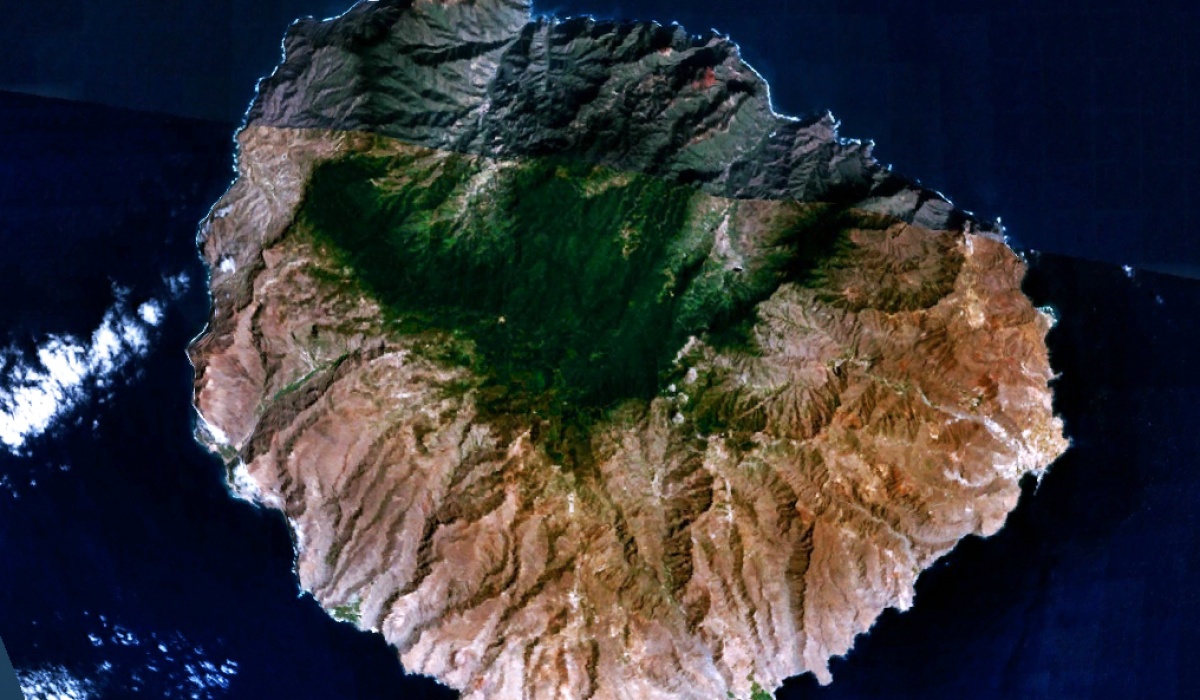
What we have just heard were two people talking across a rocky ravine. As a matter of fact, they were conducting a conversation. One tells the other to bring some large leather bags. The language they are using is called Silbo Gomero. A whistling language. The great thing about it is, it can be used and heard over long distances of up to 6 km without auxiliary means.
These recordings were made on La Gomera. We don't know who made them or when. It was probably a long time ago.
La Gomera is a small island in the Atlantic Ocean. Just a tip of a volcano sticking out of the sea. The ancient whistling language Silbo Gomero, which existed even before the Spanish Conquest, is perfect for communicating across this landscape. Whistles, as I already mentioned, can be heard up to 6 km away.
Here are some facts:
La Gomera is the second smallest of the Canary Islands. It's roughly 1,300 km from the coast of Spain and about 300 km off the African mainland. The nearest harbour is Los Cristianos on Tenerife, 38 km away. La Gomera has an airport, which is however too small for charter flights. The nearest airport for international flights is also on Tenerife.
The island is almost circular, and is roughly 21 km West-East and 18 km North-South. The surface area of the island is approximately 370 km². In comparison: Berlin covers 892 km², and so is about 2,5 times the size of the island. The volcanic island swiftly rises from 0 to 1,500 meters above sea level.
Population of La Gomera: ca. 23,000, the population of Berlin in comparison: 3,5 million.
How did the whistle get to the island?
How did the whistle get to the island? How? We don’t know. But of course there are different stories. And here is one:
In their 1413 manuscript two French missionaries report, when speaking of La Gomera, that...
“this country speaks the strangest language anywhere in the islands, articulating the words with their lips, as though they had no tongue”.
What is that about, the missing tongue? There is a myth of origin – it goes back to the Roman Empire. It is said that unwanted “elements” were exiled to the island, and also had their tongues removed or cut in two.
No one knows if the story is true. It certainly sounds good. The following is a less spectacular, but more appropriate, version:
The English traveller Samler Brown proposes in 1913 a North African origin for the whistled language, reporting that there is a similar method of communication in the Atlas Mountains of northern Africa.
Whistled languages in the world.
Worldwide, there are today about 60 to 70 whistled languages.
For example in Turkey, in the village Kuskoy - the "Village of the Birds" - and in France, in the village of Aas in the Pyrenees; or in Mexico, among the Zapotecs of Oaxaca. They are especially common and robust today in parts of West Africa, used widely in such widespread languages as Yoruba and Ewe. Even French is whistled in some areas of western Africa. And the history of the whistle tightly locked to the history civilisation.
Let’s go back to La Gomero.
How Silbo Gomero became spanish
In the 15th century the Spanish came on their ships to La Gomera. There they encountered four tribal families. Two immediately allied themselves to the newcomers, the others retreated to the mountains and formed a kind of resistance. By the end of the 15th century the indigenous people, the Guanches, were subjects of the Spanish crown.
Many of the original inhabitants were baptised and given Spanish names. It is remarkable that by the end of the 16th century the original language, Guanche, had been completely replaced by Spanish, but Silbo as a means of communication remained untouched. Since then the whistling has been in Spanish. If the invaders had wanted to, they would undoubtedly have been able to eradicate this form of communication along with the Guanche culture and language. The fact that they did not suggests that they may have seen some potential in it which they might one day turn to their own advantage.
What could this potential be?
What are the characteristics of the whistle?
